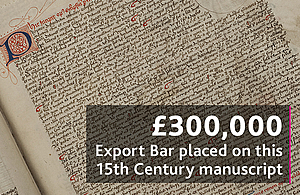
Collected scientific works (in Latin) of the physician and astronomer Lewis of Caerleon
- The work includes information that sheds new light on medieval understanding of science and mathematics
- Manuscript was completed by Welsh scientist Lewis of Caerleon, the personal physician to the Tudor King Henry VII
A 15th century manuscript that sheds new light on medieval scientific knowledge could be lost abroad.
Culture Minister Caroline Dinenage has placed a temporary export bar on the manuscript, which is worth £300,000, in a bid to save the work for the nation by offering a UK buyer or institution an opportunity to purchase the work for the national collection.
The manuscript was completed by Lewis of Caerleon (c.1440 - c.1500), a Welsh physician and highly accomplished astronomer. He played a crucial role in the royal court of the period, brokering the alliance of the future King Henry VII and Elizabeth of York, serving as a physician and astrologer to both the Houses of York and Lancaster, including Henry VII himself. Lewis also spent time imprisoned in the Tower of London during the reign of Richard III for his close association with the Lancastrians.
Lewis of Caerleon was a highly skilled astronomer who carried out observations and recorded detailed calculations aimed at predicting eclipses. He commissioned this beautifully bound manuscript from a professional scribe as a gift to a patron or library, to showcase his own scientific achievements. While some of its texts and tables are similar to those in Lewis's personal notebook held in the collections of Cambridge University Library, a number are unique to this manuscript and hold the potential to shed new light on late-medieval mathematical astronomy.
Culture Minister Caroline Dinenage said:
This manuscript is an important part of the story of how ancient beliefs led to our modern scientific understanding of the world we live in.
It is a remarkable piece by a Welsh scholar that would make an excellent contribution to the national collection. I hope a buyer can be found so we can keep this important work in the UK.
The Minister's decision follows the advice of the Reviewing Committee on the Export of Works of Art and Objects of Cultural Interest (RCEWA). The committee noted that the manuscript displayed the progression from ancient theories of astronomy toward a modern, mathematical approach. They agreed that Lewis of Caerleon was a significant contributor to the study of astronomy and the development of science in the late medieval era.
Committee Member Peter Barber said:
This beautifully written volume, still in its handsome original binding, was made for presentation, very possibly to Henry VII. Its author - a Welshman serving a Welsh king, a patriotic antiquary who was also a physician/scientist - prefigured great figures of a century later, like John Dee, while himself building on the writings of his medieval predecessors. At a time when astronomy and astrology were synonymous, Lewis of Caerleon's skills had political ramifications. They may well have contributed to Richard III's decision to keep him out of harm (and the later Henry VII's) way in The Tower. The text was meant by Lewis, who annotated it in his own hand, to be the definitive version of all of his writings and calculations. It includes notes on how far his predictions of eclipses had been fulfilled and also full versions of hitherto only partly known writings by medieval scholars. It would be a great pity if this volume by an early Welsh scholar who deserves to be better known, with its links to courtly culture, with a distinguished provenance and with its immense research potential, were to be allowed to leave this country.
The RCEWA made its recommendation on the grounds of the manuscript's outstanding significance to the study of medieval mathematical and scientific knowledge and for the Welsh contribution to the history of science in the British Isles.
The decision on the export licence application for the manuscript will be deferred until 12 June 2020. This may be extended until 12 September 2020 if a serious intention to raise funds to purchase it is made at the recommended price of £300,000.






